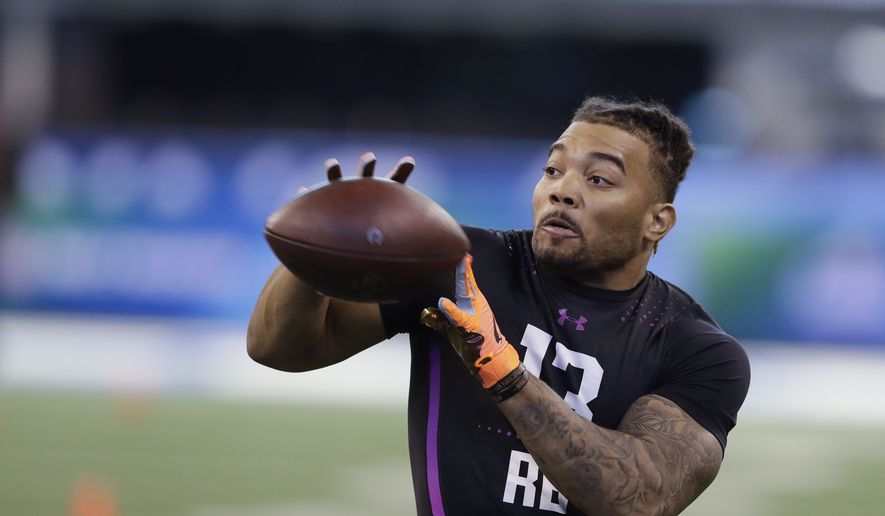NFL’s sexual-orientation questions deserve a flag for encroachment

By DERON SNYDER (as published in The Washington Times)
Making prospective employees uncomfortable is a big deal for NFL teams at the Scouting Combine. So here are a few questions that might accomplish that feat without, you know, breaking the law:
“How long have you collected scantily-clad Barbie dolls?”
“Why do you tongue-kiss random strangers’ dogs?
“Where’d you go for that first hook up with coach’s wife?”
I suppose there could be a prospect or two who wonders how the secret was uncovered. But most would shake their heads in bewilderment after the question sunk in. I imagine team officials make a game of comparing the creative ways players say, essentially, “You have me confused with someone else!”
There’s no shortage of crazy things a team can ask. Many of the questions make little sense and have neither right nor wrong answers. The goal simply is to see how players think on their feet, how they respond to the unexpected.
However, certain lines should never be crossed.
Asking if your mother sells herself is a good example. Even though the answer is no reflection on the players, the inquiry is exceedingly tasteless. The Miami Dolphins apologized in 2010 after asking wide receiver Dez Bryant if his mother was a prostitute.
It’s bad enough that a team this year brought up Derrius Guice’s mother in like fashion during an interview with the LSU halfback. But the NFL’s fixation sexual orientation is even more disturbing. Especially since queries are illegal in more than 20 states and a federal appeals court ruled last month that sexual orientation is protected by Title VII of the 1964 Civil Rights Act.
It was an issue five years ago, when tight end Nick Kasa was asked if he likes girls. It was an issue two years ago, when cornerback Eli Apple was asked if he’s gay. And it remains an issue today, despite the NFL’s public proclamations that the question is inappropriate and teams are instructed to steer clear.
Well, someone didn’t get the memo or chose to ignore it.
“I go in one room, and a team will ask me do I like men, just to see my reaction,” Guice said last week on SiriusXM Radio. “I go in another room, they’ll try to bring up one of my family members or something and tell me, ‘Hey, I heard your mom sells herself. How do you feel about that?’”
He might’ve felt like slugging that guy, an unadvised but understandable reaction in a hyper-masculine context. Talking about someone’s mother can be interpreted as certified fighting words.
But what would we say about Guice or anyone else if he threw punches upon having his sexuality questioned? And what would a violent response say about him?
I’d call him a Neanderthal, someone whose definition of manhood is as narrow as his view on the purpose of women.
Linebacker Michael Sam didn’t make it out of training camp with the St. Louis Rams in 2014 after becoming the NFL’s first openly gay draftee. Nonetheless, surely teams realized he wouldn’t be the only gay player, just the first one who didn’t mind letting the world know.
Such candor appears to be easier in certain lines of work (hair, dance, fashion). While perhaps not as visibly, it exists in areas that don’t fit the stereotype, too.
But in major pro team sports?
“This is one of the last industries where the subject is off limits,” Rick Welts told The New York Times in 2011. “Nobody’s comfortable in engaging in a conversation.”
Welts was president of the Phoenix Suns when he came out as gay that year. The revelation hasn’t hurt his career, as he now holds the same position with the Golden State Warriors.
Of course, it shouldn’t matter who the president, quarterback, first baseman, or power forward chooses to sleep with. And if those players were future Hall of Famers, dominant in their sport, I bet teammates and fans couldn’t care less.
But average players can’t be comfortable coming out, knowing the disclosure might be a factor (even subconsciously) in roster decisions. We already know some teams ask the question before a prospect can volunteer if desired.
Former NFL cornerback Wade Davis, who came out as gay in 2011, said he’s been in contact with the league since the combine. “I’ll be running a training/clinic in the offseason for coaches and staff to address (homophobia),” Davis told TMZ Sports last week.
“[I want them to] to understand the physical, emotional and spiritual cost to creating a hostile environment for gay male athletes.”
Hostility can be veiled and occur long before athletes reach the locker room. I’d love to hear about a player in Guice’s position flipping the script at the combine and putting the discomfort back in his interrogator’s lap.
GM: “Do you like men?”
Prospect: “Oh, I’m sorry. You’re not my type.
“But would you like to meet a friend of mine?”
— Brooklyn-born and Howard-educated, Deron Snyder writes his award-winning column for The Washington Times on Tuesdays and Thursdays. Follow him on Twitter @DeronSnyder.
 Follow
Follow
